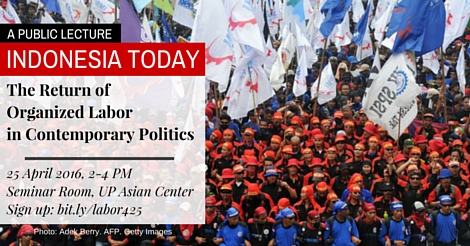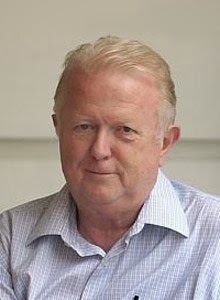 The UP Asian Center will host a public lecture, “Indonesia Today: The Return of Organized Labor in Contemporary Politics" by Dr. Max Lane on Monday, 25 April 2016, 2:00 p.m. to 4:00 p.m., Seminar Room, Hall of Wisdom, GT-Toyota Asian Cultural Center, Asian Center, University of the Philippines Diliman. The lecture is free and open to the public; seating is available on a first-come, first-served basis, but participants are encouraged to sign up to expedite the registration process on the day of the forum.
The UP Asian Center will host a public lecture, “Indonesia Today: The Return of Organized Labor in Contemporary Politics" by Dr. Max Lane on Monday, 25 April 2016, 2:00 p.m. to 4:00 p.m., Seminar Room, Hall of Wisdom, GT-Toyota Asian Cultural Center, Asian Center, University of the Philippines Diliman. The lecture is free and open to the public; seating is available on a first-come, first-served basis, but participants are encouraged to sign up to expedite the registration process on the day of the forum.
About the Lecture
The 1965 counter-revolution in Indonesia (against the unfinished national revolution) necessitated the establishment of an almost totalitarian authoritarianism under General Suharto. During the 33 years of near totalitarian rule, political agency was confined to factions and cliques within the Indonesian capitalist class and its institutions. Political agency from outside this class—from the working class and peasantry—was not simply either subordinated or co-opted, it was physically abolished. For 33 years, a de facto re-education programme was implemented, eliminating not only the previous ideologies of these classes—social democracy, radical popular nationalism and socialism—but also even the traditions associated with their history. Since the fall of Suharto in 1998, however, there has been a gradual re-entry of organised labor into the political terrain, accelerating after 2010, with large-scale national mobilisation for improvements in conditions taking place in 2011, 2012, and 2013. There is more open discussion of labor's direct participation in politics. As this continues, polarisation between the union bureaucracy elite and the more critical, militant and independent-minded union activists has begun. This new polarisation is of enormous importance as to what happens next in Indonesian national politics.
About the Speaker
 Max Lane, Ph.D. is Visiting Senior Fellow at the Institute of Southeast Asian Studies (ISEAS) in Singapore. The English translator of six of Pramoedya Ananta Toer’s works, including the Arok of Java and This Earth of Mankind and the other novels of the “Buru Quartet.” He has published several books on Indonesia, including Openness, Political Discontent and Succession in Indonesia: Political Developments in Indonesia, 1989-90 (Griffith University 1991); Unfinished Nation: Indonesia before and after Suharto (Verso 2009); and Decentralization and Its Discontents: An Essay on Class, Political Agency and National Perspective in Indonesian Politics (ISEAS 2014). He is also author of The Urban Mass Movement in the Philippines, 1983-87 (Australian National University and ISEAS 1990). In 2016, he will publish his first book of poetry and prose. An activist, Max Lane also previously served as officer in the Australian embassy in Jakarta, Indonesia. View his CV and list of other publications.
Max Lane, Ph.D. is Visiting Senior Fellow at the Institute of Southeast Asian Studies (ISEAS) in Singapore. The English translator of six of Pramoedya Ananta Toer’s works, including the Arok of Java and This Earth of Mankind and the other novels of the “Buru Quartet.” He has published several books on Indonesia, including Openness, Political Discontent and Succession in Indonesia: Political Developments in Indonesia, 1989-90 (Griffith University 1991); Unfinished Nation: Indonesia before and after Suharto (Verso 2009); and Decentralization and Its Discontents: An Essay on Class, Political Agency and National Perspective in Indonesian Politics (ISEAS 2014). He is also author of The Urban Mass Movement in the Philippines, 1983-87 (Australian National University and ISEAS 1990). In 2016, he will publish his first book of poetry and prose. An activist, Max Lane also previously served as officer in the Australian embassy in Jakarta, Indonesia. View his CV and list of other publications.
About the Organizers
The public lecture is organized by the UP Asian Center and the Third World Studies Center, University of the Philippines Diliman.
The UP Asian Center offers M.A. degrees in Asian Studies with four fields of specialization: Northeast Asia, Southeast Asia, South Asia, and West Asia. The Center also has an M.A. program in Philippine Studies that allows students to major in Philippine society and culture, Philippine foreign relations, or Philippine development studies. The Center offers a Ph.D. program in Philippine Studies in conjunction with the College of Arts and Letters and the College of Social Sciences and Philosophy. Get an overview of these programs. The Asian Center also houses a peer-reviewed, open-access journal, Asian Studies: Journal of Critical Perspectives on Asia. It has published several books and monographs, and hosts or organizes various lectures and conferences.

